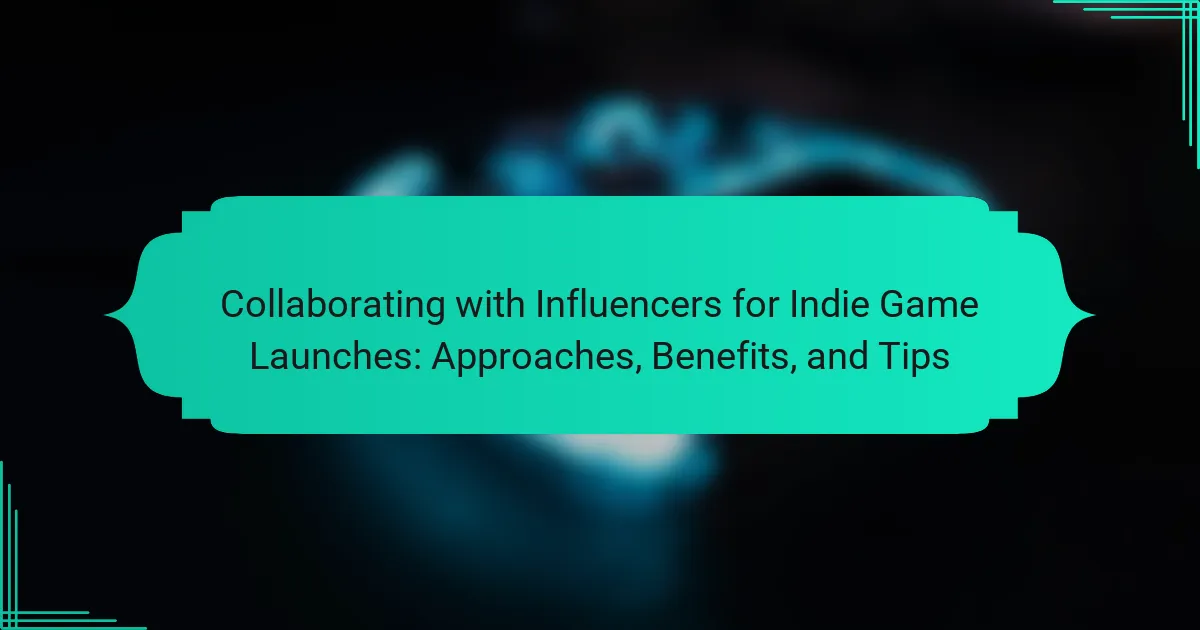Collaborating with influencers can significantly enhance the visibility of indie game launches. This article explores effective approaches for building authentic partnerships, overcoming challenges, and measuring success. It also highlights unique strategies to differentiate your game and foster community engagement. By leveraging influencers, indie developers can create impactful marketing campaigns that resonate with target audiences.
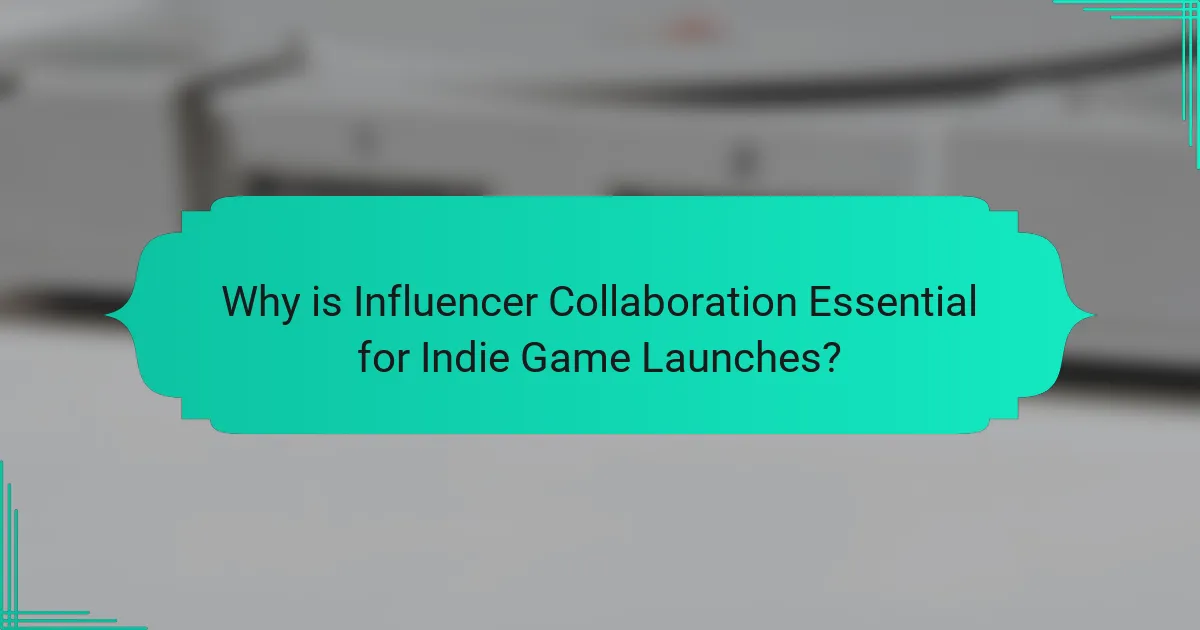
Why is Influencer Collaboration Essential for Indie Game Launches?
Collaborating with influencers is essential for indie game launches because it amplifies visibility and engages target audiences. Influencers possess established trust and can authentically promote your game to their followers. This collaboration enhances credibility and fosters community engagement, leading to increased interest and potential sales. Additionally, influencers can provide valuable feedback during the development phase, refining the game based on audience insights. By leveraging their reach, indie developers can create buzz around their launch, maximizing impact and success.
How do Influencers Impact Game Visibility and Sales?
Influencers significantly enhance game visibility and sales by leveraging their established audiences. Collaborating with influencers allows indie games to reach niche markets effectively, driving engagement and sales. Influencer-generated content can create authentic buzz, boosting pre-launch interest and post-launch sales through trusted recommendations. As a result, indie developers can achieve greater market penetration and brand recognition.
What Are the Key Benefits of Partnering with Influencers?
Partnering with influencers offers significant benefits for indie game launches, including increased visibility, credibility, and audience engagement. Influencers can reach targeted communities effectively, enhancing brand awareness. They provide authentic endorsements that resonate with potential players, driving interest and downloads. Additionally, collaborations can lead to valuable content creation that showcases the game creatively.

Which Approaches Work Best for Collaborating with Influencers?
Collaborating with influencers for indie game launches works best through authentic partnerships, targeted outreach, and engaging content. Focus on influencers who align with your game’s theme and audience for maximum impact.
Effective approaches include:
1. Building relationships with influencers before the launch.
2. Offering exclusive content or early access to generate excitement.
3. Encouraging influencers to share their genuine experiences with the game.
4. Utilizing social media platforms where your target audience is most active.
These strategies enhance visibility and create a sense of community around your game.
How to Identify the Right Influencers for Your Game?
To identify the right influencers for your game, focus on their audience alignment, engagement rates, and content relevance. Research influencers who share similar interests with your game’s theme to ensure authentic promotion. Analyze their past collaborations to gauge effectiveness and reach.
What Types of Content Should Influencers Create?
Influencers should create engaging content that highlights gameplay, shares behind-the-scenes insights, and fosters community interaction. This approach builds anticipation and connects with potential players. Effective content types include live streams, gameplay videos, and social media posts showcasing features and updates. Collaborating with influencers can amplify reach and drive interest in indie game launches.
How to Structure Compensation for Influencer Partnerships?
To structure compensation for influencer partnerships, focus on aligning payment with the influencer’s reach and engagement. Consider offering a mix of monetary compensation and incentives such as game access or exclusive content.
1. Assess the influencer’s audience size and engagement metrics to determine a fair rate.
2. Offer tiered compensation based on deliverables, such as posts, stories, or videos.
3. Include performance-based bonuses for achieving specific engagement or sales targets.
4. Provide non-monetary incentives, like early access to game updates or branded merchandise.
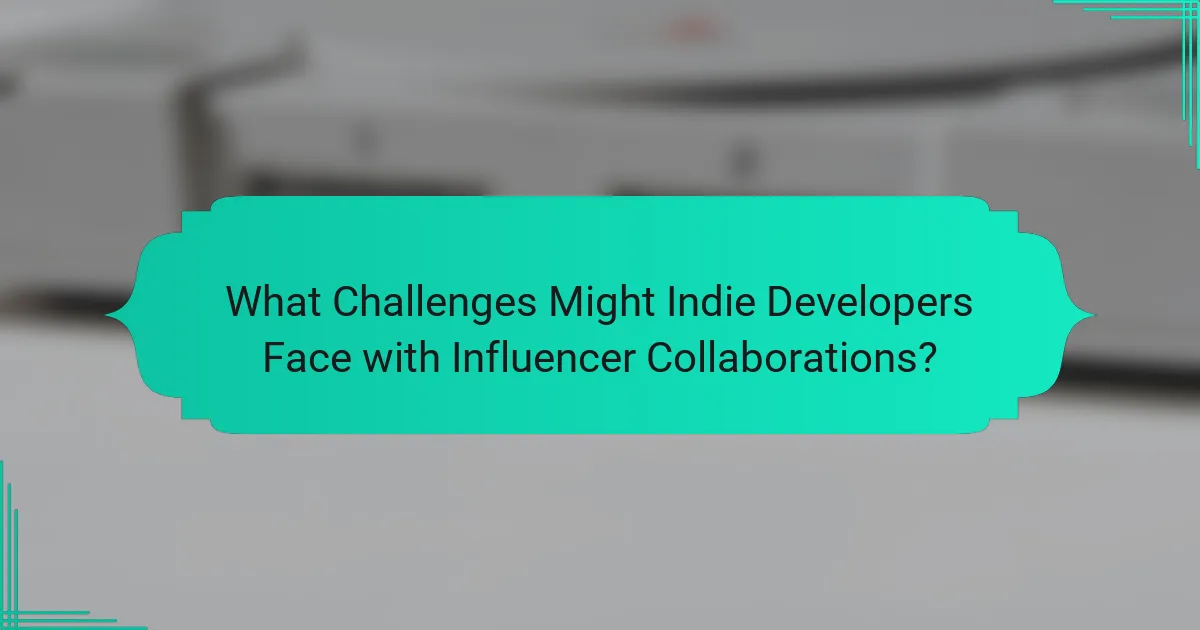
What Challenges Might Indie Developers Face with Influencer Collaborations?
Indie developers may face several challenges when collaborating with influencers. Key issues include budget constraints, as many influencers charge high fees that may exceed an indie developer’s marketing budget. Additionally, finding the right influencer whose audience aligns with the game can be difficult, leading to ineffective campaigns. Communication barriers may arise, as influencers may not fully understand the game’s nuances or target audience. Lastly, managing expectations regarding the influencer’s reach and engagement can lead to disappointment if results do not meet the developer’s goals.
How to Overcome Common Misunderstandings with Influencers?
To overcome common misunderstandings with influencers, clear communication is essential. Establish expectations upfront regarding deliverables, timelines, and compensation. Misalignments often arise from vague agreements, so detailed contracts can mitigate confusion. Regular check-ins ensure both parties stay aligned on goals and messaging. Additionally, understanding an influencer’s audience helps tailor campaigns effectively, enhancing collaboration.
What Are the Risks of Influencer Marketing for Indie Games?
Influencer marketing for indie games carries several risks. These include misalignment with brand values, potential negative publicity, and ineffective audience targeting. Collaborating with the wrong influencer can damage the game’s reputation and fail to reach the desired player base. Additionally, influencers may not deliver promised engagement, leading to wasted resources. Monitoring influencer performance and ensuring alignment with the game’s ethos are essential to mitigate these risks.

How to Measure the Success of Influencer Collaborations?
To measure the success of influencer collaborations, track engagement metrics, sales conversions, and brand awareness. Key metrics include reach, impressions, and audience interaction. Analyze data to assess the impact on game visibility and community growth. Adjust strategies based on insights for future campaigns.
Which Metrics Should Be Tracked Post-Launch?
Track user engagement, sales data, and social media metrics post-launch. These metrics provide insights into the effectiveness of influencer collaborations.
User engagement includes metrics such as daily active users and session duration. Sales data reveals total revenue and conversion rates. Social media metrics encompass follower growth, engagement rates, and reach.
Analyzing these metrics allows for adjustments in marketing strategies and enhances future collaborations. Regularly reviewing these data points ensures the game maintains momentum in the market.
How to Analyze Influencer Impact on Game Performance?
To analyze influencer impact on game performance, track engagement metrics and player feedback. Assess how influencer reach correlates with game downloads, user retention, and community engagement. Use analytics tools to measure social media interactions and in-game activity influenced by promotional content.
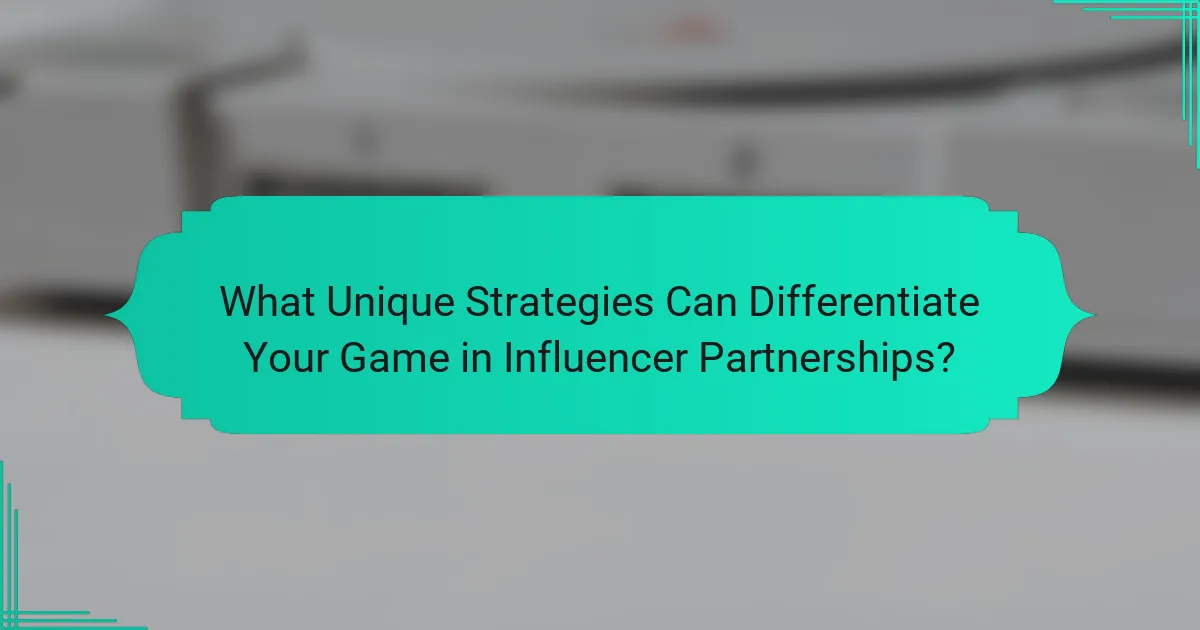
What Unique Strategies Can Differentiate Your Game in Influencer Partnerships?
Unique strategies to differentiate your game in influencer partnerships include targeting niche influencers, creating exclusive content, and fostering authentic relationships. Niche influencers often have dedicated audiences that align closely with your game’s theme, enhancing engagement. Exclusive content, such as behind-the-scenes access or early gameplay, can incentivize influencers to share your game more passionately. Building authentic relationships fosters trust and encourages influencers to promote your game genuinely, leading to more effective marketing outcomes.
How to Leverage Niche Influencers for Targeted Outreach?
Collaborating with niche influencers enhances targeted outreach for indie game launches. Identify influencers whose audience aligns with your game genre and values.
Engage in authentic partnerships by providing exclusive content or early access to your game. This builds trust and encourages influencers to share their genuine experiences.
Utilize social media platforms for outreach, focusing on channels where your target audience is most active. Track engagement metrics to assess the impact of influencer collaborations.
Leverage user-generated content from influencers to create buzz and foster community engagement around your game. This approach amplifies your reach and enhances credibility.
What Innovative Campaign Ideas Can Enhance Engagement?
Collaborating with influencers can significantly enhance engagement for indie game launches. Innovative campaign ideas include creating exclusive content, hosting live streams, and offering giveaways through influencer channels. These approaches build excitement and leverage the influencer’s audience for broader reach. Using unique attributes, such as personalized gameplay experiences or behind-the-scenes insights, can further differentiate the campaign and attract attention. Engaging influencers with established communities fosters genuine connections, increasing player interest and participation.
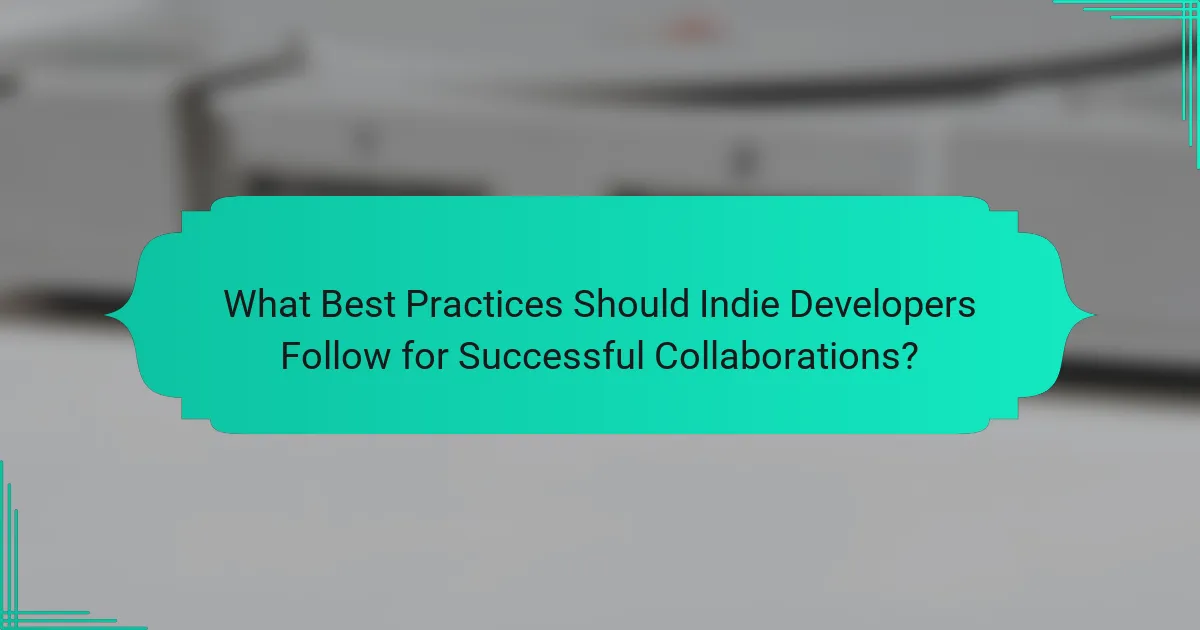
What Best Practices Should Indie Developers Follow for Successful Collaborations?
Indie developers should focus on building authentic relationships with influencers to enhance game visibility. Successful collaborations involve clear communication, mutual benefits, and strategic planning.
1. Identify relevant influencers who align with your game’s genre and audience.
2. Develop a unique pitch that highlights your game’s key features and potential benefits for the influencer.
3. Offer exclusive content or early access to incentivize collaboration.
4. Foster ongoing relationships through engagement and feedback post-launch.
These practices can significantly increase reach and engagement, leading to a successful game launch.
How to Build Long-Term Relationships with Influencers?
To build long-term relationships with influencers, focus on authentic engagement and mutual benefits. Start by researching influencers who align with your indie game’s values and audience.
Establish clear communication channels to discuss collaborative ideas that resonate with both parties. Offer exclusive content or early access to your game as a unique incentive.
Regularly check in with influencers to maintain the relationship, providing updates and support. This consistent interaction fosters trust and loyalty, ultimately benefiting both your game launch and the influencer’s content.
What Common Mistakes Should Be Avoided in Influencer Marketing?
To avoid common mistakes in influencer marketing for indie game launches, focus on strategic alignment and clear communication. Misalignment between the influencer’s audience and your game can lead to wasted resources. Ensure the influencer genuinely enjoys gaming and understands your target demographic. Inadequate briefing can result in inconsistent messaging, so provide clear guidelines and expectations. Failing to track performance metrics can hinder learning and optimization, so establish KPIs upfront. Lastly, neglecting to build long-term relationships can limit future collaboration opportunities; prioritize engagement over transactions.
How to Optimize Your Approach for Future Game Launches?
Collaborating with influencers can significantly enhance the visibility of indie game launches. Focus on building authentic relationships with influencers who align with your game’s niche and audience.
Identify influencers with a strong engagement rate rather than just a large following. This ensures your game reaches genuinely interested players. Provide influencers with exclusive content or early access to create buzz before the launch.
Encourage influencers to share their gameplay experiences, which can generate authentic reviews and discussions. Track engagement metrics to assess the effectiveness of your collaborations and adjust strategies for future launches.
